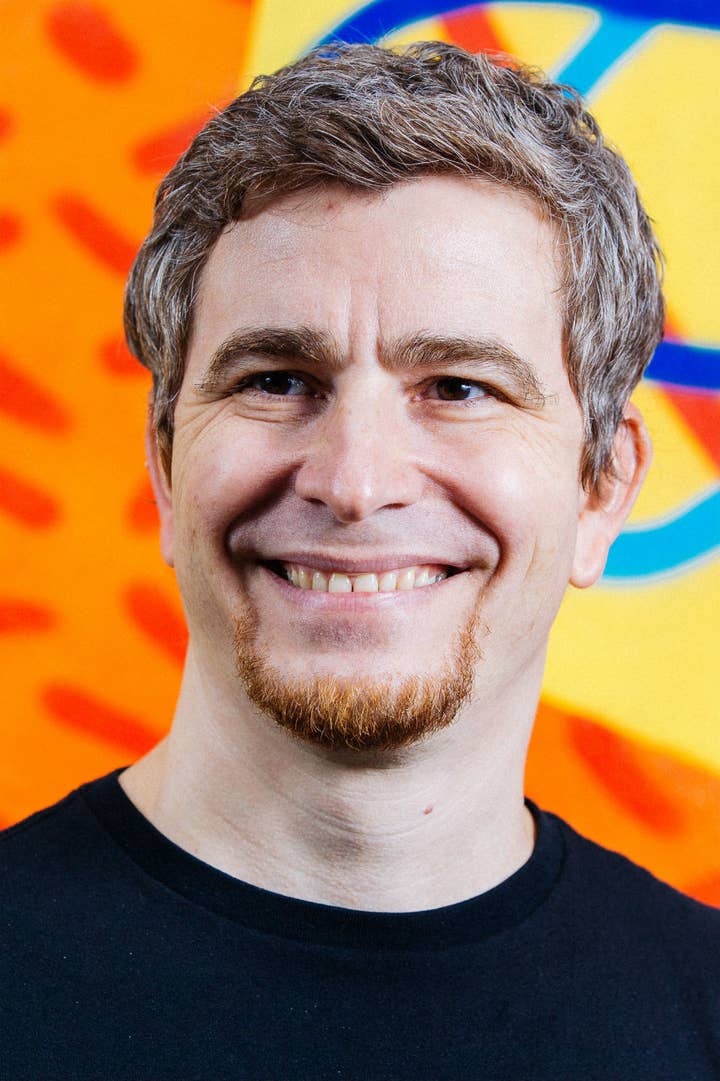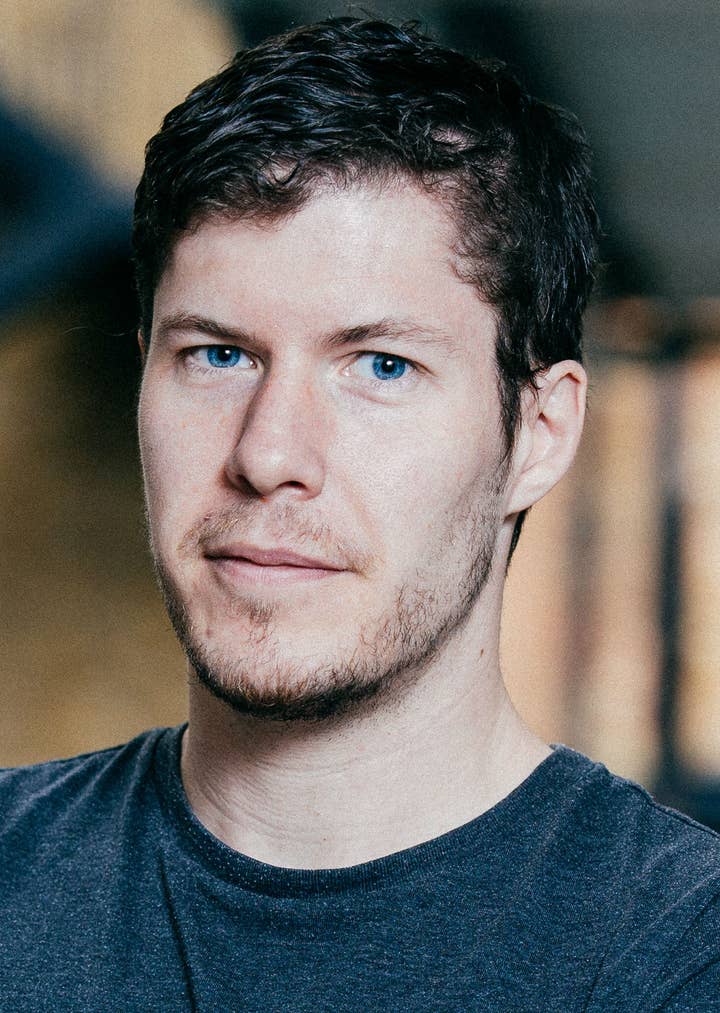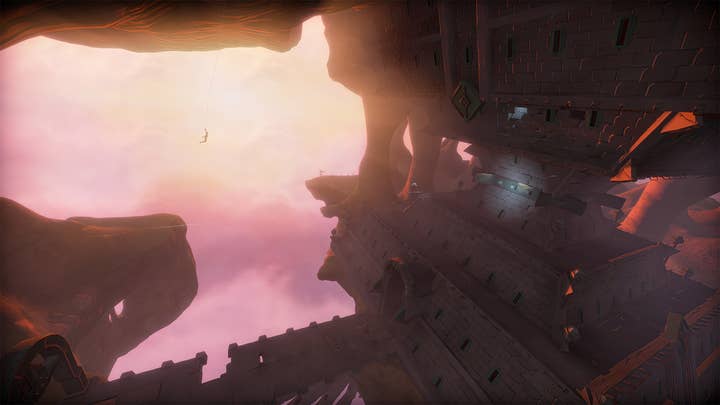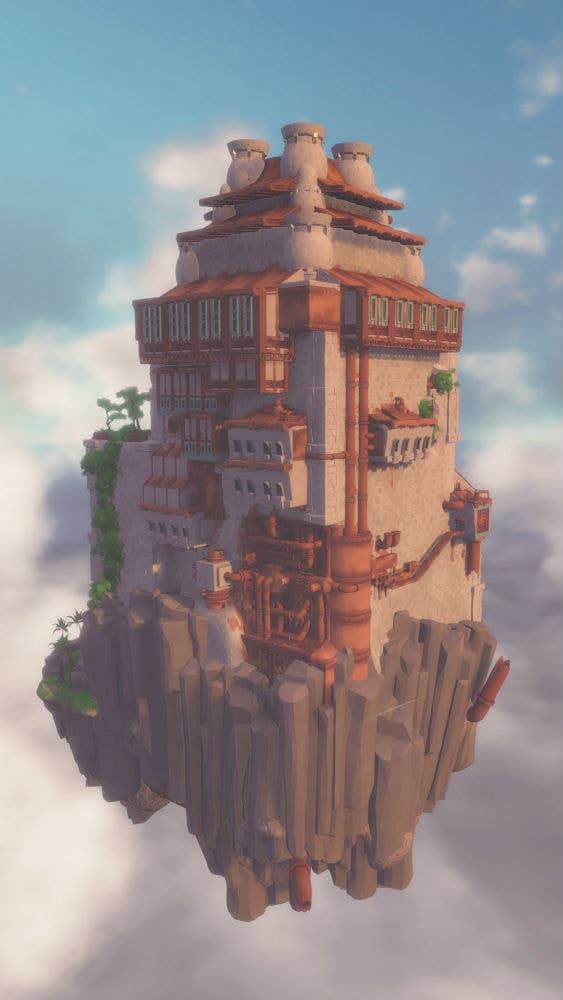Players make the game (literally) in Worlds Adrift
UK developer discusses rewriting the rules of MMO progression, avoiding exploitation with user-created content, and penis islands
Today is an important day for Bossa Studios. Worlds Adrift, by far the UK developer's biggest and most ambitious project to date, has entered Early Access - but this is more than just a launch. It's the point of no return, the moment where the studio's vision for reshaping the MMO genre proves whether or not it's viable.
Worlds Adrift takes place on a planet that has been shattered by some forgotten cataclysm, leaving only traces of the civilisations that once inhabited it. Using grappling hooks and building skyships, players are free to explore this strange place and its floating islands, investigating what caused this disaster - or just scrapping with each other in high-flying piratey antics.
You're most likely aware of Worlds Adrift, because it was the first title revealed to be using Improbable's promising SpatialOS technology, which enables larger and more persistent game worlds than the industry has previously seen. In fact, the partnership between Bossa and Improbable is so well-established, much of SpatialOS was actually built to meet the needs of the Worlds Adrift team.

Bossa co-founder and gamer-in-chief Henrique Olifiers tells GamesIndustry.biz that there is "no pressure to showcase the possibilities of SpatialOS", but instead an internal pressure to make use of its features to deliver the game players have been promised.
Here's what SpatialOS means for Worlds Adrift: everything players do has a permanent effect on the world. If their ship is destroyed or crashes into the island, the wreckage will remain there until discovered and salvaged. Bossa tells us that this will be of particular interest to the streaming community as players follow in the footsteps of their favourite hosts and even find their previous camps and shipyards.
It's fascinating tech, and you might think this is the core of what Bossa means when it claims it's going to reinvent the MMO with Worlds Adrift - but instead, the studio points to the role of the community in crafting the world.
Two years ago, Bossa Studios released the Worlds Adrift Island Creator, a version of its own toolset released via Steam to enable players to build their own floating islands. The community has embraced it, and Bossa claims the entirety of the game world has been created by these users.
"To begin with the islands were all over the place... [But] when people start to deviate too much from the tone, the community itself nudges it back to the standard that they have set themselves."
Henrique Olifiers, Bossa Studios
Even so, Olifiers says the Early Access version that launches today is "probably 20 per cent of the vision for the game we have in our heads", but the players will remain instrumental in shaping everything going forward.
"This is the start of a journey towards what the game is going to become in a few years' time," he says. "Because the players have been so instrumental in that 20 per cent, pointing us in the right direction or telling us off when we got a feature wrong, surely we want to do that with the other 80 per cent and beyond. Because God knows what Worlds Adrift is going to be in ten years' time."
Worlds Adrift has been compared in recent months to Sea of Thieves, largely thanks to similarities in the island-based open-world structure, the overarching theme of piracy (more prominent in Rare's game, of course), and the apparent reliance on emergent gameplay and player-driven stories to keep its audience engaged.
While the Xbox exclusive has fared well since launch, some players have found the gameplay to be shallow, tiring of the core loop of repetitive treasure hunts. The vague nature of Worlds Adrift's exploration-centric gameplay suggests Bossa could face the same issue, but again the community-created content is positioned as a potential solution.
"Even Blizzard struggled to keep World of Warcraft full of content, so we knew we couldn't compete with that. That is partially what drove us to get the community involved."
Luke Williams, Bossa Studios
"It's definitely a problem we identified early on," game designer Luke Williams says. "Even Blizzard struggled to keep World of Warcraft full of content, so we knew we couldn't compete with that - not with the size [of team] we have. That is partially what drove us to get the community involved.
"The islands are like the shrines from Breath of the Wild. You don't know what to expect. We don't know what to expect because we don't know what the players are going to create. We don't just have a quest to find this or do that. There are all these little things around the different areas of the world for you to explore."
Bossa has also attempted to veer away from typical MMO progression. Players do not level up in the traditional way, your health bar never increases and there is no grind for gear that adjusts your stats. Instead, the focus is on improving your ship in order to travel further and reach new areas of the map. And that's not to say the progression has been shifted to the vehicle. Cannons, for example, all do the same amount of damage, though they vary in range. It becomes a question of how many players accrue for their vessel, where they position them, and how they use them.
"There is no winning strategy," Olifiers explains. "There is no such thing as a ship that is better, only a ship that is different. Some people attach the engines to their ship facing upwards, which means they can rise much faster than anyone else. That's a valid strategy that has to be countered. So you have this ongoing, ever-changing landscape that just keeps it fresh."

Williams goes on to stress that there will be no new bosses or high-end quests for endgame players to tackle. Instead, the updates to the game will focus on systemic game design and new features that might affect both the world and how players interact with it. Additional content, as in new areas to explore, will stem almost entirely from that Island Creator and the talented players experimenting with it.
There will, of course, be cynicism about this strategy. If Bossa has had its players create the entire game world, is that not essentially outsourcing environment development to an unpaid audience?
"It is and it isn't," Olifiers reasons. "If you think about Minecraft, for instance, or every mod that you play - isn't that outsourcing the game to the community as well? If you play Counter-Strike, you're playing an outsourced game, because it was a mod on Half-Life.
"This is nothing new. If you go back to the days of Neverwinter Nights and the Aurora toolset, you played the main game but the fun of it was the mods and the stuff made by people who enjoy it. DayZ was a mod, PUBG was a mod, Dota was a mod... I could go on. There is something there that the industry overlooks and doesn't appreciate how much the players have created over time.
"Quite frankly, we could outsource to another studio somewhere, but it would never be as authentic and as fine-tuned to the players as when they create it themselves."

Williams adds that the process has also helped identify some genuine talent that could find its way into the industry one day.
"[Our tools] are also very close to 3D development tools anyway, and we're finding that some of the stuff they're doing... these guys could be professional level designers," he says. "We actually see them develop over the years. Their first island is okay but towards the end we're like 'these guys are getting really good'. You see people who played Minecraft now forming their own indie studios because they learned to mod and program through that.
"We knew we'd be called out for being 'lazy devs' but I don't think you speak to a single island creator who feels like they're being exploited."
Luke Williams, Bossa Studios
"I understand the cynicism of it, but... some of them don't even play the game, they just make islands. They do it because they want to create. We don't offer rewards, we don't try to egg them to do it - it's free software, it's more an 'if you want to, you can' kind of thing. We knew we'd be called out for being 'lazy devs' but I don't think you speak to a single island creator who feels like they're being exploited."
User-generated content does lend itself to three obvious problems. The first is copyright infringement. From Minecraft to LittleBigPlanet, titles that centre around UGC inevitably end up filled with fan recreations of established levels and locations. What's to stop someone using the island creator to add Wind Waker's Outset Island, or the floating mini-tropolis of Mario Odyssey's New Donk City into Worlds Adrift?
For the most part, Bossa says the integration of Steam Workshop enables the community to "very much regulate themselves" through upvoting and downvoting player creations. And, of course, Bossa has final say on anything that makes it into the final game.
"You get stuff that's inspired by other things," Williams admits. "We've got a place that looks like the bath house from Spirited Away - it's not a replica obviously, but it's heavily inspired, and that sort of stuff's okay. We like that. It would be quite hard to completely recreate Outset Island, to the point where I'm not even sure if that's a copyright thing. It's a weird one. Everything has to pass through us first, but if there's an issue we can just take it out of the world."

The second issue is ensuring player-created islands match Bossa's plans for the world. In previews and trailers, Worlds Adrift looks as if it will blur the lines between exploration and archaeology as players find ruins from past civilisations. There are hints that the story of this world will be uncovered slowly over years of player-led investigations, and Bossa presumably has a much more in-depth knowledge of this fiction than the island creators.
Olifiers admits it has been a worry, but the community seems remarkably respectful of Bossa's creative vision and keen to see consistency.
"To begin with the islands were all over the place," he says. "They were not hitting the mark, they did not match the universe as much as they should. As people started to be more concise and be more attuned to the game's universe, those are the ones that started to emerge as the more popular ones, and that set the trend.
"It's a very natural movement. You can see that in other crowd-sourced content like Wikipedia and so on. When people start to deviate too much from the tone, the community itself nudges it back to the standard that they have set themselves."
Williams adds that Bossa's world-building has been forced to adapt by the players' creations in some respects. The original concept was that this world and its ruins were ancient, but some of the things players built looked no more than a century old. There was no intention to add wood assets to the Island Creator, as any pre-cataclysm wooden structures would have rotted away, but this changed based on what players were building.
"We always wondered about the 'time to penis' ratio. As it turns out the first one was made by a team member."
Henrique Olifiers, Bossa Studios
"We have to play with it," Williams explains. "Players have started building wooden bridges and mansions using planks of stone, and they looked really good but they are just grey slabs set out like they're wooden planks. So we got to the point where we were like 'right, shall we just add wooden planks and wood assets and just roll with it?', because they're using it whether we like it or not. It came down to that: they're going to keep building these structures, so do we give them the tools to make those look as nice as possible.
"That's the route we're going down. So while we have this defined history and idea of the world, the actual core identity and structure of things is evolving as players are using these assets and tools. We've definitely had to adapt our vision as we go."
Olifiers adds: "And that would never happen with an outsource. We would have to go, 'no, do it like this'."
The final issue with relying on community-crafted content is crass but obvious: penises. As many a developer will tell you, give players any freedom and the right tools and your game will soon have an immersion-breaking phallus.
"We always wondered about the 'time to penis' ratio," Olifiers admits. "As it turns out the first one was made by a team member."
Luke chuckles: "The community can't beat us to a penis if we get there first."
Worlds Adrift is now available via Early Access. Bossa has not confirmed a planned timeline towards full release, or any intention to work on a console version - "Not until we nail it on PC," Olifiers says. But with fully half the staff at Bossa Studios dedicated to this project, it's clear this journey will be an important one for the company's future.

